 For absolute beginners, determining when to fuel for a half marathon and how much to fuel during training is always a tough one to nail down. Energy gels for a half marathon come in many different flavors and shapes. Typically they contain about 100 calories (roughly 21 to 25 grams of carbohydrates).
For absolute beginners, determining when to fuel for a half marathon and how much to fuel during training is always a tough one to nail down. Energy gels for a half marathon come in many different flavors and shapes. Typically they contain about 100 calories (roughly 21 to 25 grams of carbohydrates).
How Many Energy Gels do I need to take during a half marathon?
First time half marathon racers should try to consume between 4 and 8 energy gels (between 60 grams and 150 grams of carbohydrates) for the total duration of a half marathon race. These values can vary considerably based on a runner’s fitness level and estimated race finish time.
One of the main reasons that beginners are lost when it comes to fueling is due to all of the different opinions floating around. Supplemental companies want you to fuel your body with as many energy gels as your body will oxidize per hour which is roughly between 250 – 350 calories depending on your metabolism. Some super-elite runners manage to train their bodies to run on zero extra fuel except for their pre-race meal and water during the run. For the beginner and average runner, the odds are against them if they don’t fuel during training for a half marathon or marathon. Yes, I’m sure it’s been done, but at what cost to your body and your chip time?
How many energy gels can I take per hour?
Your body can only oxidize and absorb roughly 60 grams per hour (for ultra-endurance races it can be as much as 90 grams per hour). Each gel packets averages about 100 calories and 21 grams of carbohydrates. The following table can help answer that question. The amount of carbohydrates you need to take depends on your fitness level and how long you’ll be on the racecourse. Most athletes can’t stomach up to 60 grams of carbohydrates an hour. Multiple transportable carbohydrates (more than one type of sugar such as fructose, sucrose, glucose, maltodextrin) are ideal for your carbohydrate energy source during a race. I would recommend that you aim for between 30 grams and 60 grams per hour. The only way you’ll know how many grams your body can absorb is to test your carbohydrate intake during long run training sessions.
Energy gel requirements for Half Marathons and Marathons
On average you’ll probably need anywhere from 4 to 7 energy gels. This depends on how long you’re going to be on the racecourse. Typically you want to take a gel every 30 minutes. Some racers find it easiest to just go on the half-hour mark instead of every 25 minutes or every 35 minutes. I break down my fueling strategy below. Here is a typical guide, showing how many energy gels are needed for the average runner completing a half marathon?
Can I consume sports drinks instead of energy gels?
Sports drinks are a great source of energy for a half marathon race. They contain roughly about 30 grams of carbohydrates per serving. You can mix and match gels and sports drinks if you keep up with the total amount of carbohydrates. I personally don’t use sports drinks on the racecourse but I know several runners who do. Whatever you do, only drink your sports drink on the racecourse when you’re calculating your total carbohydrates. Most races do not have an accurate way of getting the exact ratio of water to mixture correct. If you’re drinking a race provided sports drink at one of the aid stations and it turns out that the fluid is mainly water, you’ve put yourself in a carb depleted state.
Pros of using sports drinks
- may cause less GI irritation during your race
Cons of using sports drinks
- You need to carry a bottle with the sports drink inside (or a hydration pack)
- If you rely on race provided sports drinks, you don’t know how many carbs you’re consuming with each cup.
Energy Gels for A Half Marathon:
- Pre Race Gel – 5-15 minutes before the race (optional)
- 30 minutes
- 60 minutes
- 90 minutes
- 120 minutes
- 150 minutes (2 hours 30 minutes)
- 180 minutes (3 hours)
- 210 minutes (3 hours 30 minutes)
Most half marathon racecourses close after 4 hours. If you need more time than 4 hours signup for a half marathon race where there is also a marathon race. You’ll have another couple of extra hours to finish your race.
Runs shorter than 60 minutes no energy gels are required
New runners that run for less than 60 minutes, which is roughly between 4 and 7 miles, only need water during their run. There is no need to eat a gel pack for runs lasting less than 60 minutes. Your energy will not be depleted and you should be able to easily complete the run
Runs between 60 and 90 minutes energy gels might be needed if training
This is a gray area for new runners. My best advice is that if you are training for a half marathon or a marathon and your runs are lasting between the 60 and 90-minute marker, then you should go ahead and be training your body to accept the gels that you will be using in the race. If you are just running to run and not really “training” for a race then you can get away with just drinking water and not fueling. Each individual runner will have to experiment with this gray area. For myself, I don’t fuel during my long runs which last less than 90 minutes which is the equivalent of about 8 – 9 miles. The key here is to listen to your body and if you are starting to feel fatigued go ahead and fuel past the 60-minute mark.
Runs greater than 90 minutes energy gels probably needed for longer runs
If you’re training for a half marathon or marathon I would recommend that during your long runs you use energy gels that you will be eating in the race. Don’t forget that training is the time to experiment with your gels. Gels have different flavors as well as different ingredients. For the most part, energy gels are 100 calories (21 grams of carbohydrates) and offer both potassium and sodium. Some runners like the gels with a caffeine boost while others don’t. Some runners, including myself, suck on shot blocks in between their dose of energy gels during a race. Each shot block is about 30 calories (10 grams of carbohydrates).
Related: Does caffeine boost running performance? How much caffeine should I consume before a run?
Long Run Training = Testing Time
The best and worst part about the training is that you get to test out your fueling. As a runner, I know first hand, that each runner is different and the number of fuel requirements varies from runner to runner. Some runners like to take a gel right before a half marathon race and marathon race while others don’t eat their first gel until 45 minutes into the race. If you’re having trouble with your long run training check out this article.
Where do I store my gels for a half marathon race?
If you’re a female racer please don’t store the energy gels in your sports bra. I’m not female, however, I have heard from several female clients and female racers that at one point they tried it. The gels ended up causing all kinds of cuts and scrapes due to the edges of the gels. I have used hydration belts, hydration packs, and simply my shorts to carry my gels.
If you don’t listen to anything but listen to this one point on carrying gels, even out the gels that you carry in your short pockets. If you need 8 gels for your race, don’t place them all in one pocket. Split them up and place four and four in each pocket. Grab your gels during the race for your pockets alternating each time. I know it sounds trivial but even the slightest shift in weight can cause your body to be imbalanced and overcompensate without you knowing it.
Is your race a virtual half marathon?
If your race is a virtual half marathon you could always run your race on a treadmill. Running on a treadmill will give you an easy way to store your energy gels and have easy access to them. If you’ve wondered if it’s possible to train for a virtual half marathon on a treadmill check out these two posts – Can I train for a half marathon on a treadmill and 17 tips to boost your motivation for a virtual half marathon.
How do I take my gels during my half marathon race?
The short answer: with water. Always eat the gel first and then wash it down with water. If you’re eating gels you won’t need any sports drinks. Sure you can have a couple on the racecourse but your energy gels will already have everything you need.
If you’re NOT carrying your own water
You’ll need to map out the water aide stations prior to your race. Your water aide stations will determine when you fuel.
My Half Marathon Fueling Strategy
Energy gels for a half marathon:
I have tried all of the GU flavors and I’m lucky in that my stomach has never disagreed with any GU flavor, yet. If I had to pick a favorite I would go with Salted Watermelon and Orange Creme (click here for my own detailed review of GU energy gels). As of late, I’ve been using Huma energy gels which have more natural ingredients and tend to go down easier (click here for my own detail review of Huma Energy Gels)
Weight: 220 lbs Height: 6′ 3″
Pre-Race Meal (as soon as I get up): 4 pieces of cinnamon bread, 2 scrambled eggs, 1/2 cup of oatmeal and peanut butter. (600-700 calories)
- No Pre Race Gel – I might eat a small snack like an energy bar.
- 30 minutes – 1 gel (drink water with gel) (21g)
- 45 minutes – 1 shot block (10g)
- 60 minutes – 1 gel (drink water with gel) (21g)
- 1 hour 15 minutes – 1 shot block (10g)
- 90 minutes – 1 gel (drink water with gel) (21g)
- 1 hour 45 minutes – 1 shot block (10g)
- 2 hours – 1 gel (drink water with gel) (21g)
- 2 hours 15 minutes – 1 shot block (if needed – I normally finish under 2:15)
The total amount of calories I consume during a half marathon race is about 500 calories (135 total carbs averaging about 52 grams of carbohydrates per hour).
Don’t forget to drink water during your half marathon race
You should try to drink between 20 and 30 fluid ounces (milliliters) per water per hour. If you’re using a hydration pack or going to use water aide stations for water it becomes a little tricker. If you’re wondering how much water to take on the racecourse I’ve got you covered. Check out this post I wrote that shows you exactly how much water to take on the half marathon race course – should I carry water for a half marathon race?
Half Marathon Backup Plan
Making sure that your body is properly fueled with energy gels for a half marathon race is half the battle. You need a good training strategy and plan to run your half marathon. If your half marathon plan falls apart consider having a half marathon backup plan.
What is burned must be restored (recovery)
After your race, you’ll need to restore all of your lost glycogen stores. you’ll need 1.2 grams per kilogram of body weight per hour (reference: Nutrition and Supplement Update for the Endurance Athlete: Review and Recommendations by Kenneth Vitale and Andrew Getzin). For half marathons, you’ll follow this for 2 hours and for marathons you’ll need to do this for up to 4 hours. After your two-hour (half marathon) or four-hour (marathon) recovery window, you will resume your normal eating caloric intake for the remainder of the day. If you feel like your stuffing yourself then back off the food. These are mere guidelines and feel free to adjust them as needed. Your body will eventually rebuild the glycogen stores even if it takes more time.
What I don’t recommend is skipping your post half marathon nutrition, especially if you think this will help you lose weight (you would be surprised.!?). Now is not the time to trim back on your calories. Eat, celebrate, and enjoy that shiny medal on your neck.
Here are the calculations based on body weight:
| Pounds | Kilograms | Stones | Carbohydrates (grams per hour) |
|---|---|---|---|
| 100 | 45 | 7 | 54 |
| 105 | 48 | 8 | 57 |
| 110 | 50 | 8 | 60 |
| 115 | 52 | 8 | 63 |
| 120 | 54 | 9 | 65 |
| 125 | 57 | 9 | 68 |
| 130 | 59 | 9 | 71 |
| 135 | 61 | 10 | 73 |
| 140 | 64 | 10 | 76 |
| 175 | 79 | 13 | 95 |
| 180 | 82 | 13 | 98 |
| 185 | 84 | 13 | 101 |
| 190 | 86 | 14 | 103 |
| 195 | 88 | 14 | 106 |
| 200 | 91 | 14 | 109 |
| 205 | 93 | 15 | 112 |
| 210 | 95 | 15 | 114 |
| 215 | 98 | 15 | 117 |
| 220 | 100 | 16 | 120 |
| 225 | 102 | 16 | 122 |
| 230 | 104 | 16 | 125 |
| 235 | 107 | 17 | 128 |
| 240 | 109 | 17 | 131 |
| 245 | 111 | 18 | 133 |
| 250 | 113 | 18 | 136 |
| 255 | 116 | 18 | 139 |
| 260 | 118 | 19 | 142 |
| 265 | 120 | 19 | 144 |
| 270 | 122 | 19 | 147 |
| 275 | 125 | 20 | 150 |
| 280 | 127 | 20 | 152 |
| 285 | 129 | 20 | 155 |
| 290 | 132 | 21 | 158 |
| 295 | 134 | 21 | 161 |
| 300 | 136 | 21 | 163 |
What should I eat after my Half Marathon (marathon) Race?
So I know how many gel packets I need to take, how much food do I need to consume. Let’s look at an example below based on the carbohydrates table below:
Susan plans on finishing her first half marathon in 2 hours and 30 minutes and she weighs 150 pounds (68 kilograms/11 stones) what are her pre/race/post fueling needs:
- pre-race she’ll need to consume a meal ranging from 500 to 700 calories
- During the race, she will need to consume between 4 and 7 energy gels (this depends on how many carbohydrates she can tolerate per hour)
- post-race she’ll need to consume 82 grams each hour for 2 hours (total of 164 grams in two hours)
Based on the table below, 82 grams for the first hour is the equivalent of:
- 1 single pattie hamburger (29 grams)
- 1 banana (25 grams)
- 1 apple (25 grams)
This totals 81 grams of carbohydrates.
Based on the table below, 82 grams for the second hour is the equivalent of:
- 1 serving spaghetti with sauce (43 grams)
- 1 granola bar (18 grams)
- 1 package of goldfish (20 grams)
This totals another 81 grams of carbohydrates.
| Food | Serving Size | Carbohydrates |
|---|---|---|
| Banana | 118 g (7") | 25 |
| apple | 182 g (medium) | 27 |
| yogurt | 170 g (1 container) | 6 |
| pizza | 107 g (1 14" slice) | 36 |
| Spagaheti with sauce | 140 g (1 cup) | 43 |
| Granola Bar | 28 g (1 Bar) | 18 |
| gatorade | 600 g (20oz) | 36 |
| hamburger | 86 g (1 pattie with bun) | 29 |
| goldfish | 30 g (1 pkg) | 20 |
| light beer | 14 g (12 oz) | 5 |
If this seems like a lot of food to try to consume over two hours then spread this out of four hours instead. The quicker you restore your depleted glycogen stores the better you will start feeling after your race. Don’t forget to add some protein in your post-race meals to help start rebuilding your muscles.
Every Runner is Different
The biggest take away is that every runner is different. You need to experiment to find what works best for you. Remember, sometimes running out of energy on a long run doesn’t really have to do with fueling, but could be from lack of adequate sleep or feeling under the weather. All runners at all age levels suffer from lousy runs – I promise. The key is to find out what works best for your body to give you optimal racing conditions.
What are my recommendations as a coach?
I recommend any of the following gels:
- Huma energy gels are now my top pick for energy gels – The only drawback is that they are a little large in size. But the taste is absolutely great plus all-natural ingredients.
- GU energy gels are also one of my top picks. I’ve used them for 10 of my half marathon races without fail.
- Hammer Gels are also tasty. I’ve been trying them out on smaller distance runs such as 10Ks.
Energy Gel Reviews
- Energy Gel Review Summary
- Clif Shot
- GU
- GU Roctane
- Hammer
- Honey Stinger
- Honey Stinger Organic
- Huma
- Huma Plus
- Muir
- SIS
- Spring
- vFuel
I’ve spent 6 weeks on my recent half marathon energy gel review. You can take a look at the best performers in 6 categories.
Click Here to check out the extensive energy gel review.
| Help support me and subscribe to my YouTube channel. YouTube video - 30 ways to make your runs less painful! Coach Scott's Credentials:
|
To sign up for a FREE half marathon training schedule, log sheet, and pace predictor CLICK HERE.
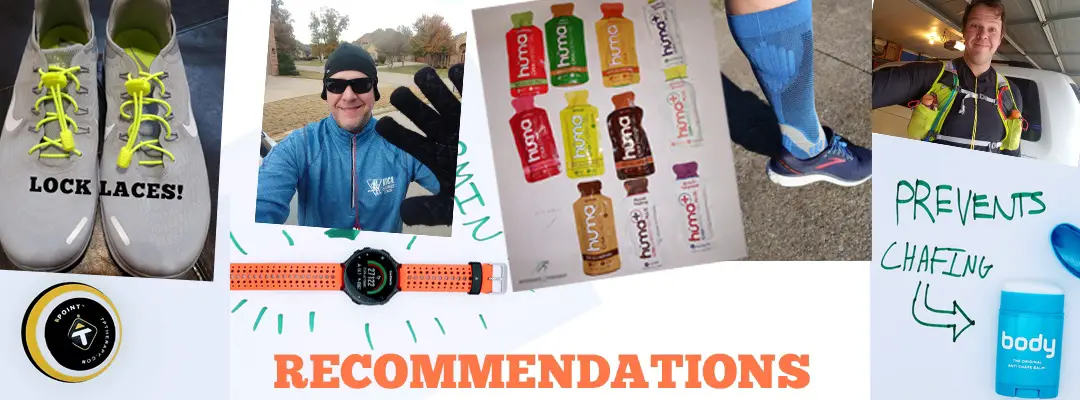
Recommended gear for runners
Connect with me:
| facebook.com/BeginnerToFinisher/ |
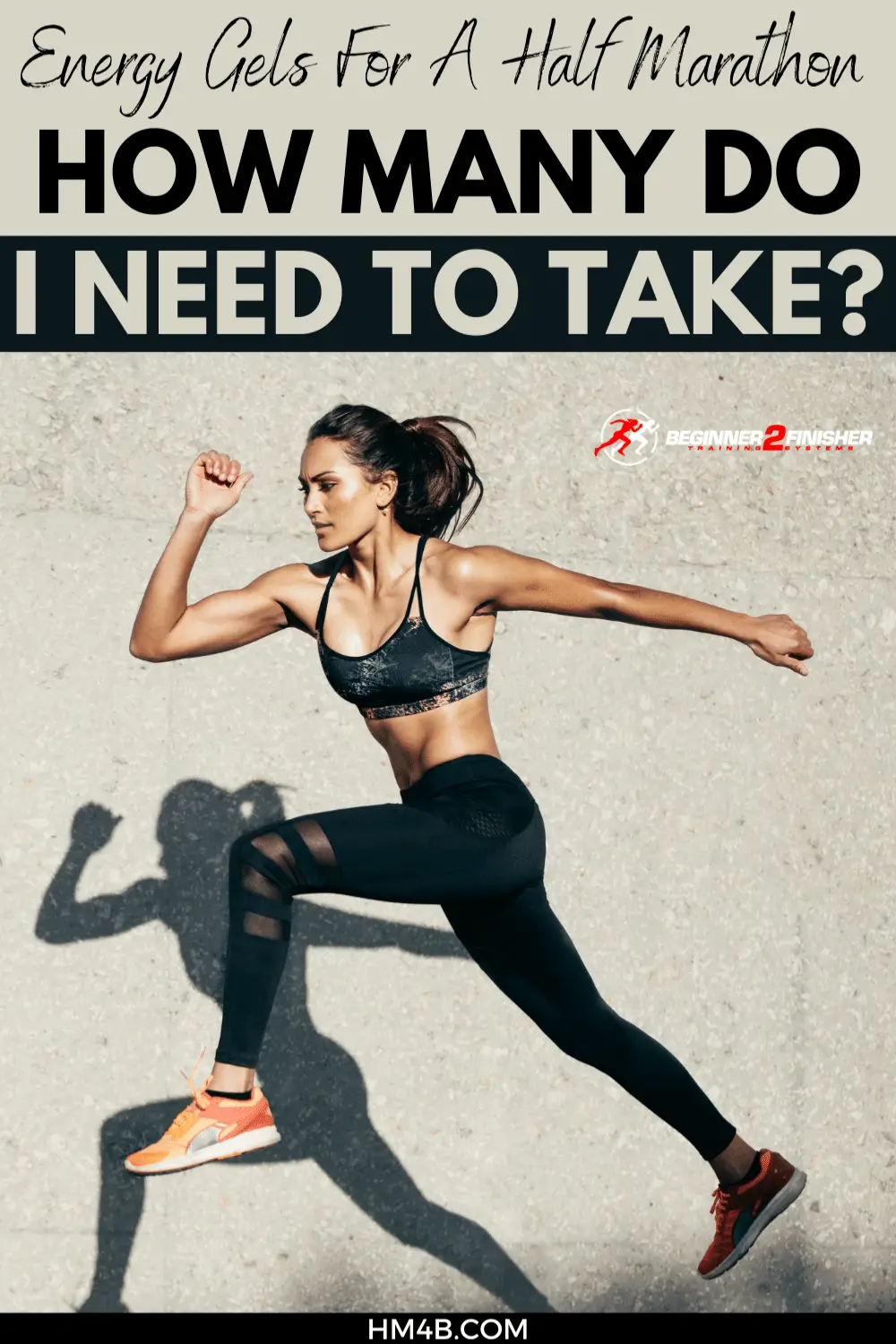
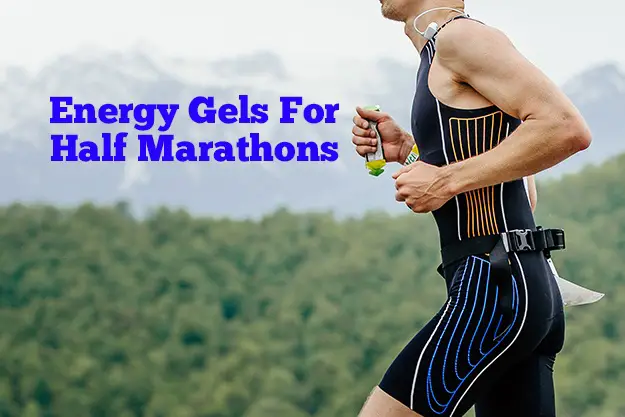
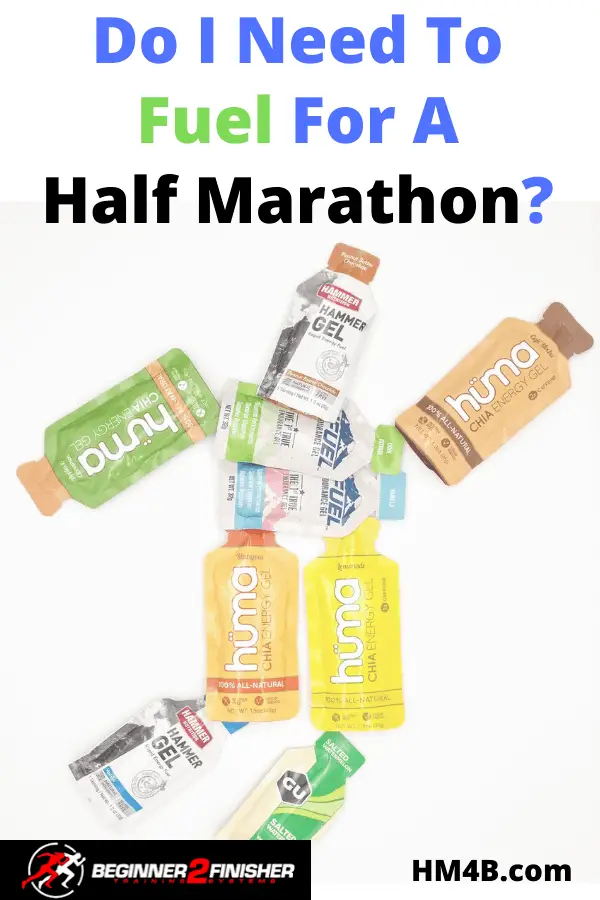
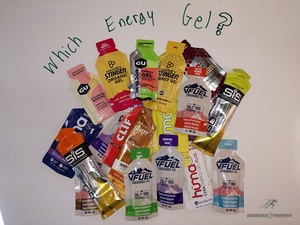
16 thoughts on “Energy Gels For A Half Marathon – How many do I need to take?”